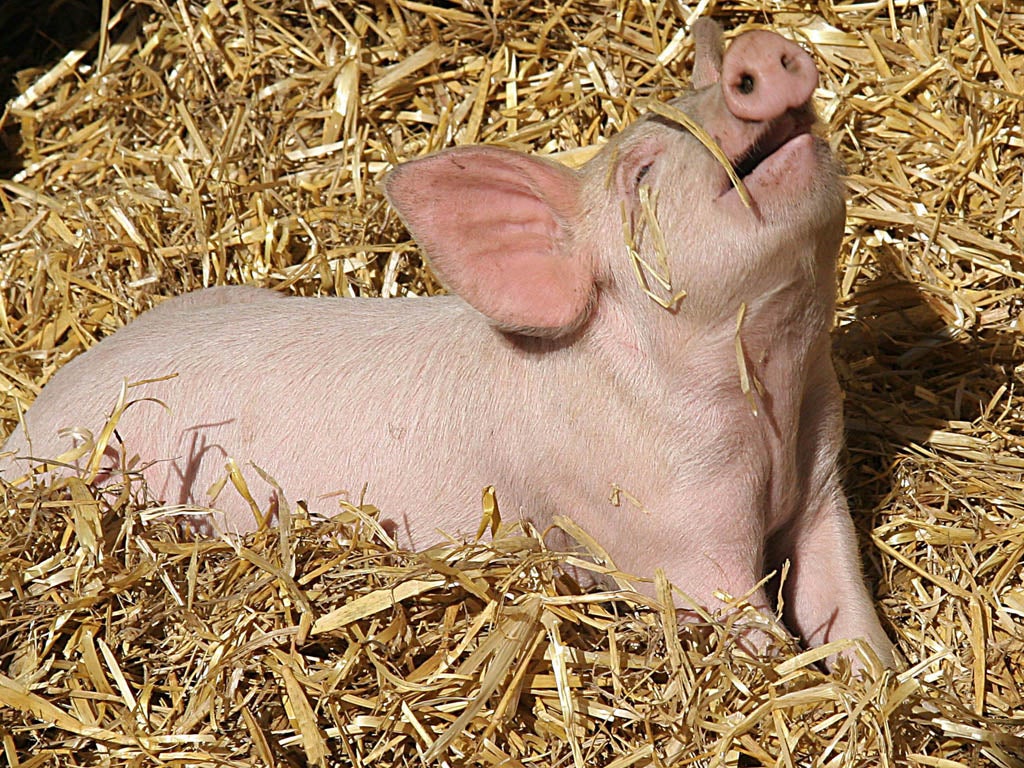The primary school teaching about pig rearing is right: Children must understand meat production
If I had my way, every secondary school pupil would be taken on both intensive farming and abattoir visits so that they really know at first hand what goes on


Peasenhall Primary School near Saxmundham in Suffolk is rearing three piglets.
The project is designed to help the children to understand the provenance of the meat they eat. In the summer the animals will be sent for slaughter and this has been explained to the school’s 25 pupils.
Animal rights campaigners are furious and an online petition objecting to the principle of rearing animals for meat in schools had attracted 4,600 signatures from all over the world. Headteacher Mrs Kath Cook and her colleagues are receiving such vitriolic hate mail that she has asked for police protection for the school. A group called Colchester Animal Defenders is promoting the campaign and there are threats of demonstrations outside the school.
In fact the Peasenhall Primary School Project is part of a wider move to connect children with food and its sources. A growing number of schools are opening miniature farms, usually in connection with local organisations. There has been a 50% increase in such projects in the last six years.
I am a vegetarian. And that is why I am in favour of such work in schools.
I have not (knowingly) eaten meat, poultry, fish or any of the by-products of slaughter for over 30 years. I made this decision originally partly because of growing evidence that it is a healthier way for individuals to eat. And once I’d proved to myself that I could live very well without flesh foods there no longer seemed any moral reason to justify eating it, even occasionally. Moreover meat is globally an unsustainable way of feeding the world’s growing population because you can, for example, grow eight times as much grain for human consumption in a field which will support a single animal.
That’s my view. It’s a decision I came to. I expect my position to be respected – as it generally is – but I never proselytise. And I disapprove totally of harassment or aggression by pressure groups. Violence, even the verbal variety, is never the best way of presenting opinion. Instead, I believe that every individual should be free to make the meat decision for him or herself and that means being fully informed.
There is a lot of hypocrisy applied to the ethics of meat consumption. People don’t want to think about abattoirs and their work. Many people prefer their meat products sanitised and disguised in supermarket plastic wrapping. Cuts, joints and offal which might just remind the purchaser of the source animal tend to be less popular. And I suspect it’s why sausages have always sold well – they don’t look like a bit of dead animal. And as for people who say squeamishly “Oh I couldn’t possibly kill my own food” … my argument is that, in that case they have no right to eat it.
We owe it to children to break such attitudes down with honesty and without prejudice. Of course I don’t want young children deliberately frightened with excessively nasty images but they should be told, and shown, the truth about meat. And school projects are good way of doing this. Most pigs (and other creatures) are reared in much less pleasant conditions than those piglets at Peasenhall, so this is clearly an appropriately gentle way of initiating the children who are not, incidentally, allowed to name, handle, sentimentalise or make pets of these animals.
If I had my way, every secondary school pupil – at age say 14 or 15 – would be taken on both intensive farming and abattoir visits so that they really know at first hand what goes on. I’d build it into the curriculum – not because I want to convert the whole nation to vegetarianism, although it might help to make abattoirs a bit more accountable - but because I want people to be sufficiently well educated to make knowledge-based decisions for themselves. In a few years we’d have a much better food-educated general public who would fully understand the stages of meat production.
If, once properly clued up, you still believe that meat is a natural and moral way for human beings to feed themselves then I respect your point of view as much as I expect you to respect mine.
Join our commenting forum
Join thought-provoking conversations, follow other Independent readers and see their replies
Comments
Bookmark popover
Removed from bookmarks